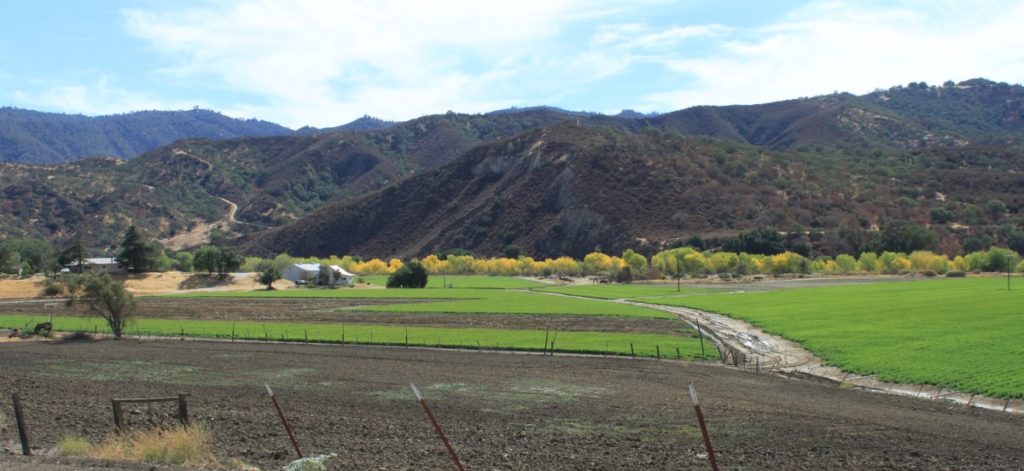Successful Integration: How SGMA and IRWM Can Utilize Each Other’s Strengths
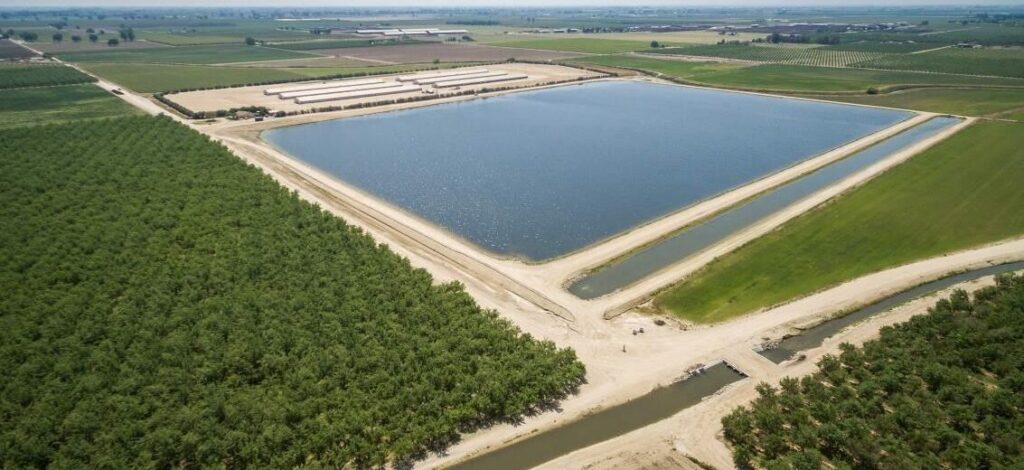
Guest commentary from Soua Lee, Program Manager of the Kings Basin Water Authority, on behalf of the IRWM Roundtable of Regions, posted at Maven’s Notebook:
How does a region integrate Sustainable Groundwater Management Act (SGMA), a program mandated by State legislation, with Integrated Regional Water Management (IRWM), a voluntary collaborative effort, to implement regional water management solutions?
A question often asked, but with no definitive answer depending on who you ask. This article discusses how IRWM and SGMA share a similar approach that involves comprehensive management on a regional scale and provides examples of where the two programs are working together successfully.
Click here to read this article.
WEBINAR: Successful collaboration between IRWM and SGMA
This webinar discusses the benefits of successful collaboration between groundwater sustainability agencies implementing the Sustainable Groundwater Management Act (SGMA) and Integrated Regional Water Management (IRWM) planning efforts.
The speakers were:
- David Orth, Principal, New Current Water and Land
- Rob Swartz, Manager of Tech Services, Regional Water Authority and American River IRWM
- Angela Islas, Community Development Specialist, Self-Help Enterprises
The panel was moderated by Lance Eckhart, General Manager of the San Gorgonio Pass Water Agency.
Q&A: Elevating NGOs and Community Groups in Groundwater Decision-Making
From the Water Foundation:
Through the NGO Groundwater Collaborative, non-governmental organizations (NGOs), Tribes, and California residents share information and resources to help each other participate in the state’s groundwater management programs. We spoke with Jennifer Clary, California Director for Clean Water Action California, and Emily Finnegan, Project Manager for Local Government Commission’s water programs, about the collaborative and what’s coming up for the group.
OpenET: A Web Application to Transform Water Management in the Western United States
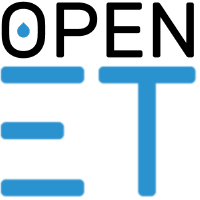 Environmental Defense Fund (EDF), NASA, the DesertResearch Institute (DRI) and Google announced plans today to develop a new web application called OpenET to enable western U.S. farmers and water managers to accurately track water consumption by crops and other vegetation using data from satellites and weather stations.
Environmental Defense Fund (EDF), NASA, the DesertResearch Institute (DRI) and Google announced plans today to develop a new web application called OpenET to enable western U.S. farmers and water managers to accurately track water consumption by crops and other vegetation using data from satellites and weather stations.
OpenET will fill a critical information gap in water management in the West. Today, access to accurate, timely satellite-based data on the amount of water used to grow food is fragmented and often expensive, keeping it out of the hands of many farmers and decision-makers. Water supplies in the western U.S. are critical to the health of our communities, food supply and wildlife, but they are facing increasing pressures in the face of population growth and a changing climate.
Applications of OpenET data include:
●Informing irrigation management and scheduling practices to maximize “crop per drop” and reduce costs for water and fertilizer.
●Enabling water and land managers to develop more accurate water budgets and innovative management programs that promote adequate water supplies for agriculture, people, and ecosystems.
●Supporting groundwater management, water trading and conservation programs that increase the economic viability of agriculture across the West.
NEW RESOURCE: Bilingual video series helps explain SGMA
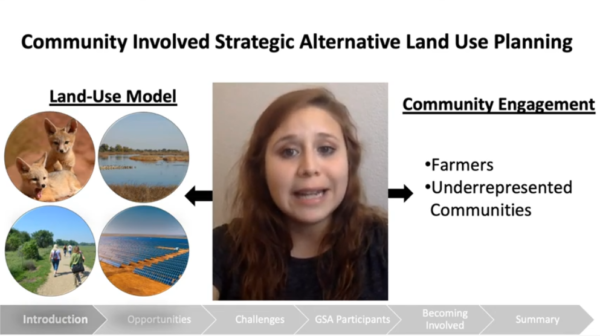 Are you interested in learning more about California’s Sustainable Groundwater Management Act (SGMA)? If yes, this channel is for you!
Are you interested in learning more about California’s Sustainable Groundwater Management Act (SGMA)? If yes, this channel is for you!
As a doctoral candidate, Vicky Espinoza’s work involves keeping farmers and community members in the San Joaquin Valley informed and engaged with SGMA. If you are a farmer or community member of California’s San Joaquin Valley and would like to become involved in my doctoral research you can email her at caliwaterag@gmail.com
Thank you!
Click here to visit CaliWaterAg on YouTube.
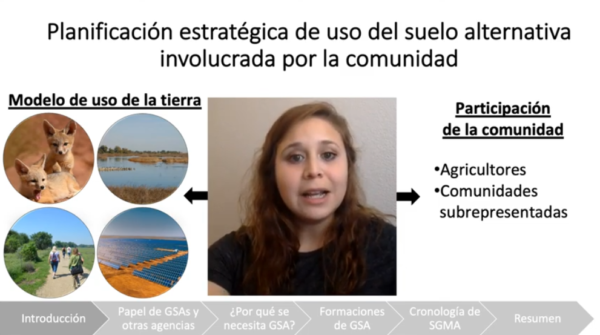 ¿Está interesado en aprender más sobre la Ley de Manejo Sustentable de Aguas Subterráneas (SGMA) de California? Si es así, ¡este canal es para ti!
¿Está interesado en aprender más sobre la Ley de Manejo Sustentable de Aguas Subterráneas (SGMA) de California? Si es así, ¡este canal es para ti!
Como candidata a doctorado, el trabajo de Vicky Espinoza implica mantener informados e involucrados a los agricultores y miembros de la comunidad en el Valle de San Joaquín con SGMA. Si usted es un agricultor o miembro de la comunidad del Valle de San Joaquín de California y le gustaría participar en mi investigación doctoral, puede enviarle un correo electrónico a caliwaterag@gmail.com
¡Gracias!
NOTICE: Update to Bulletin 74, California Well Standards: DWR Convenes Technical Advisory Committee for Update of Well Standards
From the Department of Water Resources:
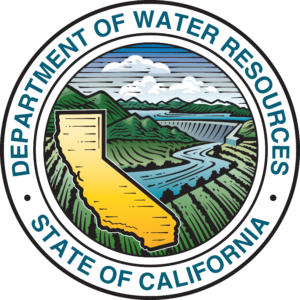 The Department of Water Resources will be updating DWR Bulletin 74, California Well Standards and is convening a Technical Advisory Committee to guide the update.
The Department of Water Resources will be updating DWR Bulletin 74, California Well Standards and is convening a Technical Advisory Committee to guide the update.
Technical Advisory Committee
Committee members will represent a wide range of stakeholders and will convene from March 2021 to March 2022. The committee will break out in smaller groups to focus on specific topics. Those topics include the four well types included in the standards: Water, monitoring, cathodic protection, and geothermal heat exchange. DWR’s technical team will consider recommendations from the committee when updating the standards.
If you are interested in joining the committee, please email Sharon Hu, Kearns & West, at shu@kearnswest.com, by October 9, 2020. Kearns & West is collecting the candidate list for the committee on behalf of DWR.
Public Review Process
Once the standards have been updated, DWR will release a public review draft and will hold public workshops to collect and consider public comments before finalizing the standards. DWR will submit the final standards to the Water Boards for adoption into the Model Well Ordinance. Following submission, DWR will train well designers, installers, inspectors, and regulators in the updated standards.
Engagement Opportunities
You can get involved in the update of the well standards in the following ways:
-
-
- Share ideas about improving the standards by submitting comments to the Bulletin 74: California Well Standards Comment Portal.
- Sign up for emailed updates and Bulletin 74 announcements.
- Email questions or comments to Bulletin74@water.ca.gov.
- After March 1, 2021, provide input to Technical Advisory Committee members.
- Provide public comments once the draft standards are released.
-
DWR UPDATES: Submit fall groundwater level data to CASGEM in October; Members wanted for Well Standards Technical Advisory Committee; Application deadline extended for SGMA Watershed Coordinator Grant Program; and more …
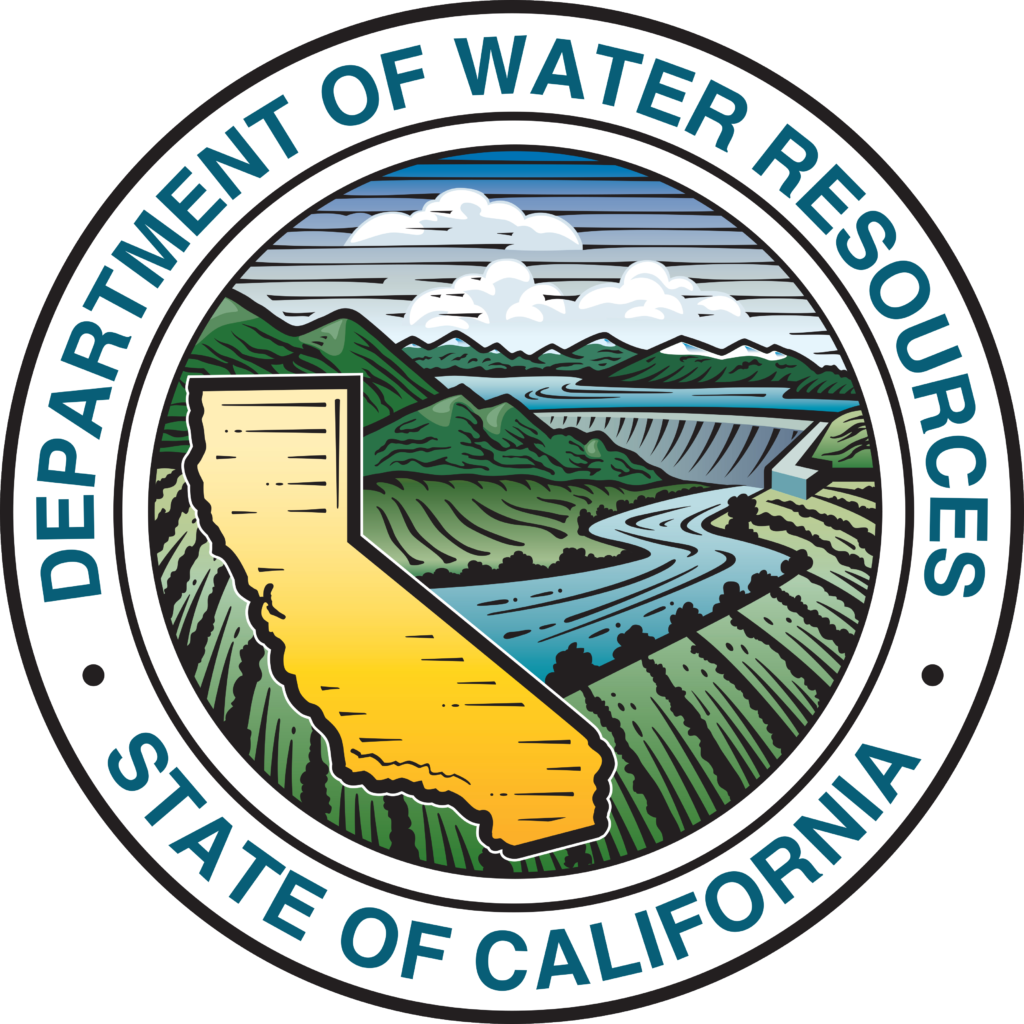 NEW Submit Fall Groundwater Level Data to CASGEM in October
NEW Submit Fall Groundwater Level Data to CASGEM in October
Monitoring Entities for the California Statewide Groundwater Elevation Monitoring (CASGEM) Program are asked to submit fall 2020 groundwater level measurements to the CASGEM Online System (OS) in October. The data is due within 30 days of collection, and no later than December 31.
The Department of Water Resources (DWR) understands the COVID-19 pandemic and state emergency declarations may interfere with timely data collection. If fall data cannot be collected in a timely manner, then a “no measurement code” should be submitted.
Monitoring wells in a basin/subbasin that are not transferred to a groundwater sustainability agency (GSA) remain associated with the original agency and have automatically been designated as voluntary wells in the CASGEM OS. DWR encourages the continued monitoring of these wells because groundwater level data is important for understanding conditions within the basin.
For technical issues or questions, please connect with your Region Office CASGEM contact found on the CASGEM webpage.
NEW Members Wanted for Well Standards Technical Advisory Committee
DWR is forming a Technical Advisory Committee for the update to DWR Bulletin 74, California Well Standards. The committee will convene from March 2021 to March 2022 and members will break out into smaller groups to focus on specific issues.
If you’re interested in joining the committee, please email Julie Haas by October 9, 2020, at Julie.Haas@water.ca.gov.
Submit ideas or comments related to California Well Standards on the Bulletin 74 comment portal and sign up to receive emailed updates and announcements.
NEW Application Deadline Extended for SGMA Watershed Coordinator Grant Program
The application deadline for the California Department of Conservation SGMA Watershed Coordinator Grant Program has been extended to October 15, 2020, because of the statewide fire emergency.
The grant provides funds for watershed coordinator positions and projects in high- and medium-priority basins. Special districts, GSAs, GSAs with approved alternatives, nonprofit groups, local governments, and tribes may apply.
For questions, email wcp@conservation.ca.gov or call (916) 324-0850.
NEW DWR Publishes Article on Community Member Involvement in Groundwater Planning
A new digital article Clean, Reliable Water: How to Get a Seat at the Table for Groundwater Planning is available on the DWR website. The article explains how community members can be involved in groundwater planning.
Additional articles can be viewed on the DWR Updates webpage.
REMINDER Written Translation Services Available
DWR’s written translation service is available to help with communication to non-English speaking constituents. Translation services for materials are available in Chinese, Hmong, Korean, Laotian, Punjabi, Spanish, Tagalog, and Vietnamese. Applicants can submit up to 5,000 words per basin/subbasin.
For details, visit the Written Translation tab on the Assistance and Engagement webpage.
REMINDER Public Meetings Can Be Held Remotely During Pandemic
Governor Newsom’s Executive Order N-25-20 encourages elected officials to conduct public meetings by teleconference or other electronic venue during the pandemic. The order temporarily waives requirements in the Bagley-Keene Act and Brown Act as long as specific requirements are met. The order applies to GSAs and others involved in the implementation of SGMA.
REMINDER Submit Your GSP Initial Notification
Before starting a GSP, agencies are required to notify DWR in writing using the SGMA Portal – GSP Initial Notification System. The portal allows edits to be made to previously submitted Initial Notifications, including the ability to withdraw a submittal.
For more information, contact the regional coordinators in DWR’s four Regional Offices. For assistance with the system, email Monica.Reis@water.ca.gov.
Connect with Your Basin Point of Contact
DWR has designated basin points of contact to assist local agencies as they develop and implement their plans and to assist with applications for Technical Support Services and Facilitation Support Services.
For regional inquiries, contact sgmp_rc@water.ca.gov.
For general inquiries, contact sgmps@water.ca.gov.
SGMA in the news
Small Farmers Shortchanged by SGMA
“When Governor Jerry Brown signed the Sustainable Groundwater Management Act (SGMA) into law in September 2014, he said that “groundwater management in California is best accomplished locally.” With the first round of plans made available for public comment this year, it appears that, while the state certainly ceded control to local management agencies, those same agencies have prioritized the interests of big agriculture and industry over small farmers and disadvantaged communities.
A June 2020 paper from UC Davis published in the international journal Society & Natural Resources, as well as work done by the Fresno nonprofit Leadership Counsel for Justice and Accountability, have shed light on the procedural inequities. … ”
Read more from Estuary News here: Small Farmers Shortchanged by SGMA
Citizens group begins deep dive in Napa Valley groundwater issues
“A large citizens group has begun shaping a state-required plan to make certain Napa Valley groundwater serving world-famous vineyards and wineries is never sucked dry. The Napa County Groundwater Sustainability Plan Advisory Committee — 25 people appointed by the Board of Supervisors representing such interests as farming, wineries and the environment — was in action last Thursday with a Zoom meeting. … ”
Read more from the Napa Register here: Citizens group begins deep dive in Napa Valley groundwater issues
Sonoma County: Healthy groundwater?
“Sonoma Valley has a Groundwater Sustainability Agency (GSA) that is working to produce a Groundwater Sustainability Plan (GSP) by January 1, 2022. The GSA is a Joint Powers Authority (JPA) agency made up of the Sonoma County, the City of Sonoma, Sonoma Water, Valley of the Moon, Water District, North Bay Water District, and the Sonoma Resource Conservation District. The GSA process was mandated by state law in 2015, by the Sustainable Groundwater Management Act, or SGMA. Sonoma Valley is a SGMA-defined high priority groundwater basin for multiple reasons, large dependence on groundwater, possible seawater intrusion, and that in some areas, withdrawals are exceeding recharge. … ”
Read more from the Sonoma Sun here: Sonoma County: Healthy groundwater?
All invited to Solano Subbasin Groundwater Sustainability Agency Collaborative’s town hall
“The Solano Subbasin Groundwater Sustainability Agency Collaborative (Solano Collaborative) will host its first Virtual Town Hall, where updates will be given on the implementation of the Sustainable Groundwater Management Act (SGMA) in the Solano Subbasin. Also offered will be background on SGMA; progress in developing the Groundwater Sustainability Plan (GSP); information about groundwater science; and how the public can stay involved. A question and answer session will be part of the program. … ”
Read more from the Vacaville Reporter here: All invited to Solano Subbasin Groundwater Sustainability Agency Collaborative’s town hall
East Tule GSA to charge farmers for pumping water
“Farmers whose only access to water is pumping from their own well will get their first glimpse at what the state’s new groundwater management law will cost them next month. On Oct. 1, the East Tule Groundwater Sustainability Agency (ETGSA) will hold a public hearing to discuss a groundwater extraction fee for property owners who rely on groundwater to irrigate their crops. The meeting is open to the public, not just those affected by the fee or those within the boundaries of the GSA … ”
Read more from the Sun-Gazette here: East Tule GSA to charge farmers for pumping water
“Madness and arrogance” blamed for one lawsuit against desert groundwater agency
“Two lawsuits accusing the Indian Wells Valley Groundwater Authority of ramming through a plan that ignores water rights and, according to one plaintiff, is intended to “destroy agriculture” were filed this week. At issue is a controversial $2,000-per-acre-foot fee approved by the authority last month that would be charged to certain groundwater users over a five-year period. That money is intended to raise $50 million to buy Central Valley water and, somehow, bring it over the Sierra Nevadas to replenish the overdrafted desert aquifer. … ”
Read more from SJV Water here: “Madness and arrogance” blamed for one lawsuit against desert groundwater agency
Consultants share their top 10 lessons learned from 5 years of SGMA implementation
“California’s Sustainable Groundwater Management Act (SGMA) is a complex program with a new language that must be mastered by consultants, basin managers, and stakeholders alike. When California first embarked upon the SGMA journey five years ago, there was a lot of trepidation about implementing this bold and untested groundwater management program.
M&A’s SGMA team has worked on 13 Groundwater Sustainability Plans (GSPs), including three GSPs submitted in January 2020. It hasn’t always been easy, and there have been plenty of bumps along the way, but we’ve learned a lot in those five years, and we are happy to share some of what we learned. … ”
Click here to read this article from Montgomery & Associates.
Rebalancing Agricultural and Natural Land
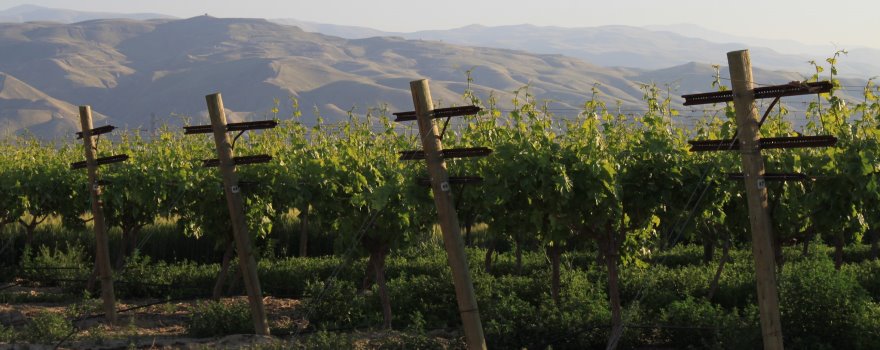 From Stanford’s Water in the West:
From Stanford’s Water in the West:
“Over the next 20 years, San Joaquin Valley farmers may need to temporarily fallow or permanently retire over half a million acres of cropland as California pushes towards sustainable groundwater use.
But, according to new research led by Stanford University and The Nature Conservancy, using an informed approach to land management that engages and compensates landowners for dedicating land to habitat can spur recovery of biodiversity in local ecosystems and provide other environmental benefits for people.
While California’s San Joaquin Valley produces crops totaling over $35 billion a year on five million acres of land, expanding irrigated agriculture has led to significant challenges such as groundwater overdraft and drinking water contamination, along with major losses of biodiversity and habitat.
Implementation of the Sustainable Groundwater Management Act (SGMA) – which limits groundwater withdrawal to bring water use into balance with supplies in California – provides an opportunity for conservation actors to work with farmers and re-envision the balance between agricultural and natural land. … ”
Click here to continue reading this article from Stanford’s Water in the West.
Research Briefs: CA Farmer Perspectives on Groundwater Management
From the Water Foundation:
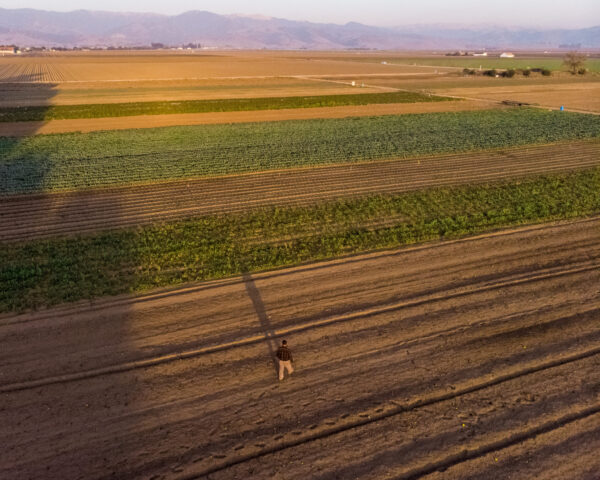 “Producing food requires large water resources, and in California, thousands of farms are mostly or solely reliant on groundwater sources. While farmers are integral stakeholders in sustainable groundwater management, the perceptions of individual farmers regarding water policy and management are not well understood.
“Producing food requires large water resources, and in California, thousands of farms are mostly or solely reliant on groundwater sources. While farmers are integral stakeholders in sustainable groundwater management, the perceptions of individual farmers regarding water policy and management are not well understood.
Food system and natural resources researchers at the University of Vermont surveyed Yolo County farmers in 2017 to understand their perspectives on SGMA, water management practices, and policy preferences. In 2019, with support from the Water Foundation, Meredith Niles at the University of Vermont and Courtney Hammond Wagner at Stanford University expanded their survey and analysis to farmers in Fresno, Madera, and San Luis Obispo counties, in partnership with local county farm bureaus.
Together, these four county-level surveys of 690 farmers revealed many similarities in farmers’ perspectives, despite agricultural and sociocultural differences. … ”
Click here to continue reading at the Water Foundation.
See also: To Achieve Sustainable Groundwater Management, CA Needs a Bigger, Inclusive Table, commentary by Alesandra Nájera and Mike Myatt

